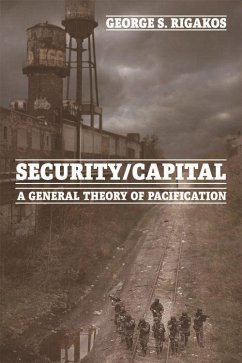'In an age when capital wins time and again and everyone from politicians to academics insist that we must all bow down in the name of security, this book challenges the power of both. The outcome is a radical deployment of the concept of pacification which will transform our understanding of the wars carried out in the name of security/capital.' Mark Neocleous, Professor of the Critique of Political Economy, Brunel University 'In this powerful interrogation, Rigakos clarifies and extends pacification theory by showing the intimate connection between capitalism and (in)security, historically and here today. His passionate message is that no vision of a post-capitalist future can afford not to take security seriously.' Georgios Papanicolaou, Reader in Criminology, Teesside University A radical social theory of the security-industrial complex How has security become the pre-eminent organizing principle of modern life? It is now inextricably bound up with capital accumulation and Empire. Mass demonstrations against the ceremonial gathering of corporate and state elites during meetings of the WTO, APEC or the G20 have cast in stark relief the politics of the 99% with that of the 1%, have drawn visible, geographic boundaries around the permissibility of dissent and have facilitated the occupation and colonization of urban space for the purpose of 'extending the scope of productive labour' and the circuit of capital accumulation. The resilience and growth of the security-industrial complex is rooted not only in its capacity to reproduce the current global economic system ideologically and coercively through pacification - to make workers more productive - but also that security itself is economically productive even when it fails. This book is the first comprehensive sociological treatise on the security-industrial complex, offering a general theory of security based on a critical engagement with the works of Marx and Foucault. George S. Rigakos is Professor of the Political Economy of Policing at Carleton University. He is the Editor of Red Quill Books and is one of the founding members of the Antisecurity Studies Group. Cover image: Soldiers advancing on abandoned train tracks © Chris Coir/Getty Images
Hinweis: Dieser Artikel kann nur an eine deutsche Lieferadresse ausgeliefert werden.
Hinweis: Dieser Artikel kann nur an eine deutsche Lieferadresse ausgeliefert werden.








